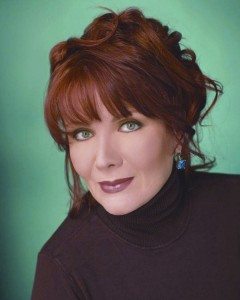
 In her current show at 54 Below, based on the work of an eclectic and worthy group of female singers and songwriters, Maureen McGovern evinces no diminution in her vocal and dramatic warmth and power. She may be, as she says on stage, "slouching toward 66" and suffering from "CRSS (Can't Remember Shit Syndrome)," but that affliction is evident only in a couple of false starts on songs and an infrequent need to check her set list for the next number. But who needs perfection and slick patter when her musical and lyrical delivery is as direct and all-embracing as this? If anything, the overt wisdom McGovern has acquired in some 40 years of singing professionally (and living life) has enhanced her already powerful ability to engage with an audience.
In her current show at 54 Below, based on the work of an eclectic and worthy group of female singers and songwriters, Maureen McGovern evinces no diminution in her vocal and dramatic warmth and power. She may be, as she says on stage, "slouching toward 66" and suffering from "CRSS (Can't Remember Shit Syndrome)," but that affliction is evident only in a couple of false starts on songs and an infrequent need to check her set list for the next number. But who needs perfection and slick patter when her musical and lyrical delivery is as direct and all-embracing as this? If anything, the overt wisdom McGovern has acquired in some 40 years of singing professionally (and living life) has enhanced her already powerful ability to engage with an audience.
McGovern has chosen most of her songs from her own early Baby Boomer lifetime, which of course coincides with the rise of the singer-songwriter era, especially for women—and with the lifetimes of much of her audience. In some cases, she sings the numbers pretty much as their creators had, in respectful homage. She re-interprets other songs by altering emphasis, tone and tempo, and by more overtly acting as well as singing them. The astonishing overall effect for the audience is much like hearing the songs for the first time. In her first full song—apart from sampling Annie Lennox's "Sing" (my sisters, sing) as her act's titular number—McGovern makes it clear that this generous set will not be a mere walk down 1960s and 70s Memory Lane. In her take, "I Am Woman" (Helen Reddy, Ray Burton) starts out much more slowly than Reddy's totemic version, in a calmer, almost confiding voice. But just as the lyric line "I come back even stronger" emerges, McGovern does just that, but with an almost gospelish fervor, as contrasted with Reddy's all-out roar.
On the other hand, McGovern's renditions of many of the signature songs women wrote for themselves are fairly straight homages, as if the originators' versions could not be improved upon. These include "Poetry Man" (Phoebe Snow), "So Far Away" (Carole King), "And When I Die" (Laura Nyro), "Help Me" (Joni Mitchell), and "At Seventeen" (Janis Ian). On other songs, McGovern gives more visual dramatic emphases to her deliveries than the composer-singers had, particularly on "The Rose" (Amanda McBroom) and "Ode to Billie Joe" (Bobbie Gentry).
On another King song, "I Feel the Earth Move," McGovern begins by echoing King's thumping pop delivery, only to segue into a surprising and welcome all-out jazz take on the second half of the song, ably abetted by bassist Jay Leonhart. (Jeff Harris is McGovern's musical director, pianist and arranger.) This leads quite naturally into the even jazzier rendition of Annie Ross's tongue-twisting lyrics to Hampton Hawes's cool bebop "Jackie." Other happy surprises in the set include harking back before McGovern's own musical upbringing to Ella Fitzgerald's "A-Tisket, A-Tasket" (written with Al Feldman) and Billie Holliday's "God Bless the Child" (with Arthur Herzog). Going way back, to the late 19th and early 20th centuries, McGovern pays a moving, patriotic tribute to the women poets who provided the words that were set to others' music: Julia Ward Howe ("Battle Hymn of the Republic," to a traditional tune); Emma Lazarus ("Give Me Your Tired, Your Poor," to music by Irving Berlin); and Katherine Lee Bates ("America the Beautiful," Samuel A. Ward).
Comic relief comes in the form of "The Baby Sitter" (Dar Williams), which McGovern sings in a little-girl voice, and a sextet of Ellie Greenwich songs from the early 1960s (all co-written by Jeff Barry, four of them also co-written by Phil Spector, and one also co-written by George "Shadow" Morton). Wisely and mercifully, McGovern delivers only a few bars of each of five of the numbers: "Da Doo Ron Ron," "Do Wah Diddy," "Leader of the Pack," "Be My Baby," and "And Then He Kissed Me." A full rendition of the sixth Greenwich song, "Chapel of Love," leads to a robust audience sing-along.
Thematically fitting, McGovern's encore to her satisfying varied set is "Come in From the Rain," by two women composers, Carole Bayer Sager and Melissa Manchester.